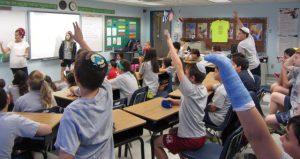Israeli parents get a crash course in homeschooling

After Israeli Prime Minister Benjamin Netanyahu shut down the country’s schools and universities until at least after Passover, Israeli parents, like their counterparts in other countries shut down by the COVID-19 virus, suddenly found themselves confronted with the task of overseeing their children’s education.
For parents already facing the strain of self-isolation, keeping healthy and working from home, finding the right balance of studies and free time for their children is becoming a daily challenge.
Efrat resident Adena Mark Kapon’s daughter, who was studying in a pre-military academy at the time of the lockdown, is now taking several hours of online classes a day at home in Judaism, philosophy and other topics.
Kapon told JNS that her daughter’s eighth-grade teacher “has been amazing, sending her students daily encouraging WhatsApp messages to check on them, and see how they are feeling.” She says that the teacher sent assignments in bulk so that the students can keep busy for the long term, and encouraged them to do some work each day, without pressuring them and adding to an already stressful reality.
These are just several examples of how Israel’s more than two million Israeli school children are continuing their education in this uncharted COVID-19 reality.
Many teachers have elected to continue their classes using various communication platforms, while at the same time doling out assignments for their students to do at home. But after just several days of homeschooling, Israeli parents and the educators themselves are seeing that there are going to be many bumps along the way.
Parents already dealing with plenty of COVID-19-induced stressors are now forced to also make sure their kids aren’t just staring at screens all day or just bouncing off the walls, and are actually getting some school work done. And in some cases, it is nearly impossible logistically for students to get their assignments done.
For example, Yacova Guigui, a mother of five from the northern city of Pardes Hanna, shared with JNS a recent Facebook post she wrote calling on the prime minister to tell the schools to stop bombarding children with online classes and assignments. “Hey Bibi … This is a nightmare, managing five kids and all your expectations. The average Israeli family has five to seven kids and maybe one computer. Do the math! Drop it! Let us enjoy our children! Let the teens sleep in! Let us survive this. Who’s with me?”
At the same time, Aliza Sussman, the head of the English department at the Ariel elementary school in Modi’in and an English teacher herself, described the chaotic situation in which it was decided that schools would be shuttered in favor of online homeschooling.
“All of a sudden,” she told JNS, “we had to have an emergency meeting last Saturday night, while at the same time our principal was in quarantine, and it was crazy how we had to figure out how we would be teaching 800 students.”
“Everyone is trying to do their best under the circumstances.”
She said that while some of the teachers were familiar with the online resources, not all were. “I’m not blaming the teachers,” she said, “it’s the responsibility of the Ministry of Education to teach the teachers how to use … technology in order to teach remotely.”
In response to complaints from some parents about student workloads, she said that “teachers can’t win. Either we send too much work, or we aren’t sending enough. We care about our students and want to find a balance for a normal schedule of learning without stressing them out about it. Everyone is trying to do their best under the circumstances.”
Sussman said that her school is utilizing the “Flipgrid” platform which allows educators to ask questions, with students responding in a video format.
The situation has made Sussman more empathetic towards the educators and their students in southern Israel, whose studies are often disrupted as a result of rockets fired by terrorists in the Gaza Strip.
Ultimately, she said, “Hashem [God] gave us this [situation], to go back to the basics and work on the nucleus of our family. Students should study for around two hours a day, but now it’s time for playing with your kids, reading, cleaning for Passover—going back to the basics and keeping sane.”
‘We provide guidance, almost like coaches’
It isn’t only Israeli educators who are focused on helping the country’s students—and Jewish students all over the world—amid the COVID-19 crisis. One particular Israeli body is reaching out to help Jewish educational institutions around the world that are under lockdown.
Mickey Katzburg is the director of the World Center for Jewish Education (WCJE), Israel’s leading center for Jewish pedagogical expertise, tools and teacher support, which works with more than 150 Jewish schools worldwide.
As a result of the situation, Katzburg and his team have launched a 24-hour hotline (+1-718-785-4113) to provide educators with the guidance necessary to quickly create school-specific online curriculums in the fields of Judaic, Hebrew and Israel studies.
“We are a pedagogical center and listen to the needs of the teachers,” he told JNS. “If it’s a problem with the [educational] technology we help find them solutions. Or if they are lacking materials, we get it to them. But we don’t just hand out books; we provide guidance, almost like coaches to help them in the classroom.”
According to Sheli Ehrlich, who serves as the Head of Pedagogical Center for WCJE, “We advise teachers on two main issues. When schools move to distance learning using our digital books, sometimes they need guidance on learning the Learning Management System. In addition, before the schools we work with around the world started closing, there was a rush to get books for the kids to have at home. So we shipped them the books very quickly.”
Katzburg said that thanks to support from the Hirsch Foundation, that helped heavily subsidize shipping costs, the WCJE was able to ship books to Jewish schools in Canada, Panama, Brazil, the United States, and many other countries, arriving within two to three days.
Eva Goldstein-Meola, who has been running homeschooling programs for children over the past 18 years, is the director of the Open Tent Academy online homeschooling platform, which has a staff of 10 teachers. As a result of the COVID-19 scare she has had numerous inquiries from parents in Israel and abroad about online classes.
“Every day you wake up, and it’s a fresh day.”
While her upcoming semester doesn’t officially start until after Passover/spring break, she is setting up online learning immediately for groups of kids in grades two to 12 who don’t have anywhere to turn to continue studying. “We are just flying by the seat of our pants,” she told JNS, to accommodate those who want to learn. “As long as we feel we can give quality education, we are willing to develop a curriculum for them.”
As a teacher of homeschooled children and a parent who homeschooled her own daughter for many years, Goldstein-Meola offered advice for parents dealing with this new educational reality.
“Every day you wake up, and it’s a fresh day,” she said. “Homeschoolers look at each day as an individual component. Focus on the present.”
“Try to initiate educational activities that apply to more than one child in the family. You will get burnt out if you only focus on one kid at time. Kids learn from art projects, reading books, videos; it doesn’t have to be paper and pen. For example, there is kitchen science—baking brownies can be a class on fractions. Have kids read a recipe and make a shopping list. You can take anything and turn it into a teachable moment,” she added.
“Read out loud to your kids or have older kids read to younger kids. The more you do things as a group, the easier it will be. Homeschooling is not from 8 a.m. to 3 p.m. It should be about 2.5 hours, and the rest of the day should be for fun.”
Kapon said that in addition to their work for school, she encouraged her children to create a daily schedule and make sure they were being productive, and that they were taking care of themselves “mentally, physically and emotionally” during this difficult period. “They have been doing yoga, running, making a scrapbook, school work and house work, and they have been keeping to it,” she said. “I reassured them that I am here to guide them.”


